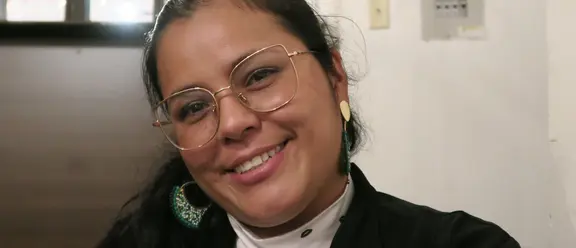Colombia: A former child soldier reports
Yina fought as a child soldier for the FARC guerrillas in Colombia. But she managed to break free and start a new life. The Terre des Hommes partner organization "Taller de Vida" was a great help to her. Knut Henkel spoke with Yina.
How did you come to join the FARC guerrillas?
I grew up with my grandparents. They had three farms and, among other things, illegally cultivated opium poppies. We children had to work very hard, were beaten, and ran around in hand-me-down adult clothes and old rubber boots. There was no compulsory schooling back then. Our daily life consisted of work and abuse. The FARC guerrillas controlled the area, and a unit came by our house regularly. When my aunt, who was twelve at the time, and I came in from the fields, they suggested we go with them. We were worn down by the beatings and the terrible treatment we'd received at home—we agreed immediately.
Was life with the FARC better than with your grandparents?
Yes, definitely. I was accepted by the FARC, not mistreated, and much better cared for. I only received my own new underwear and socks after joining the FARC. The guerrillas became my family, but I had to abide by strict rules. The FARC punished violations rigorously.
How can one return to civil society?
Yes, I know many people who haven't managed to gain a foothold in civilian life, either professionally or personally. The Taller de Vida project was crucial for me. After three years with the guerrillas, I was arrested by the police after a firefight and ended up in a state institution. From there, at around 14 years old, I came to Taller de Vida. There, I participated in the theater group. Through theater, I learned to reflect on my time as a child soldier and to express myself. Psychological help and support are extremely important for children and young people like me—and I received that at Taller de Vida. Thanks to this help, I completed my nursing training. Taller de Vida is like a second family to me. A family that forgives, because I made many mistakes and was given a second chance. I seized it.
With the help of Taller de Vida and Terre des Hommes I even went to the United Nations in New York to report on my experiences and to present the UN Secretary-General with red handprints collected worldwide as a protest against the use of child soldiers.
And what are you doing today?
I studied social work and now work in youth services. It was a dream of mine: to help those who find the way out that I myself found.
Please help with a donation